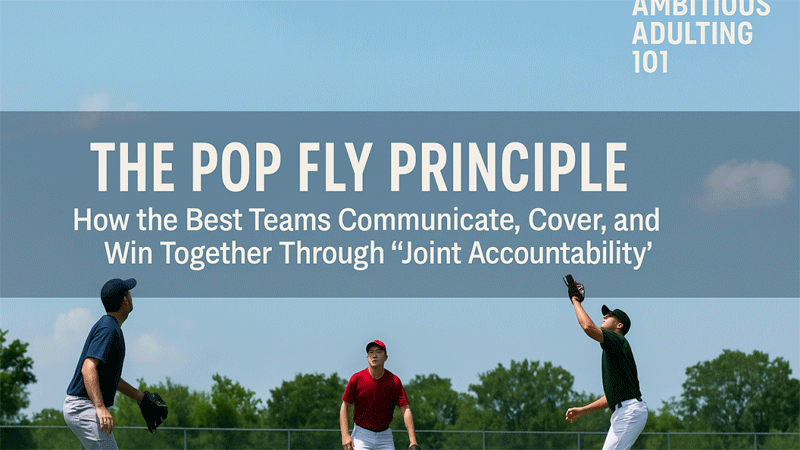You may not know that I’m a die-hard Red Sox fan. (Always have been. Grew up loving the Sox and suffering through 20 years of “We’ll get ’em next year.” Before the 2004 World Series. (If you were my friend back then, you probably remember my flip phone text winning the World Series, as it was sent to everyone in my contacts…)
It may be because I’m upset about Rafael Devers being traded to the Giants… but today I’m in a baseball sort of mood. (Goodbye, Rafie…)
If you’ve ever watched kids play in Little League, you’ve seen this play…
It all starts with a pop fly.
Two kids sprint towards it…
Neither of them calls it.
Neither of them backs off.
Neither of them caught it.
And right before they collide… (Let’s say that they don’t this time…)
…the ball just drops… right between them.
(Cue the silence… and then the collective groan from every parent in the stands.)
We laugh when it’s little kids, right? It’s cute. They’re learning.
But it’s not as funny when it happens on your sales team, your leadership staff, or your business unit.
Same situation. Different stakes.
The ball drops, and suddenly the silence isn’t cute—it’s costly…
What do we do next? (Hint: We look for someone to blame or begin making our excuses/deliver our “pre-error prepared excuse” to avoid the blame…)
That’s just generally how adults do it… (But read on and let’s see how ambitious adults do it…)
Most of us were taught that “accountability” means getting in trouble when things go wrong. But here’s what I’ve come to love, from The Oz Principle by Connors, Smith, and Hickman (Note: this was the first management book I read!):
“Accountability is a personal choice to rise above one’s circumstances and demonstrate the ownership necessary for achieving desired results—to See It, Own It, Solve It, Do It.”
Accountability is not about blame.
It’s about ownership. It’s about someone stepping up and saying, “I’ve got this,” even if it wasn’t technically their ball.
The best teams—whether in baseball or business—don’t stand around pointing fingers. They communicate. They move. They fill gaps, cover bases, and call the ball.
Here is where our teammates freeze:
- Roles aren’t clear.
- Results aren’t well-defined.
- There’s a fear of stepping outside the job description.
- People believe accountability is something done to them, not something they choose.
Real growth? Real performance? Real “Ambitious Adulting”?
That happens when we stop hoping someone will fix it and start acting like we’re all on the same team.
Yes, you may have an assigned position on the field- but when a pop fly is hit to shallow left, the shortstop, left fielder, and center fielder all start to run towards the ball to ensure that the team succeeds and the best play is made!
The most powerful environments create a culture of JOINT ACCOUNTABILITY.
It’s not just about your results. It’s about our results. And this can only happen when each person owns their position and supports the people around them.
Here are your questions of the week to consider:
- Where have you seen the ball drop in your organization?
- How often do people wait instead of moving?
- And most importantly… are you calling the ball, or getting out of the way so someone else can play it? (And what should you be doing?)
Accountability isn’t about getting it perfect. It’s about playing like someone who wants to win the game, not just protect their position.
Now, “Play Ball”. ⚾
(And “Go Sox!”)

